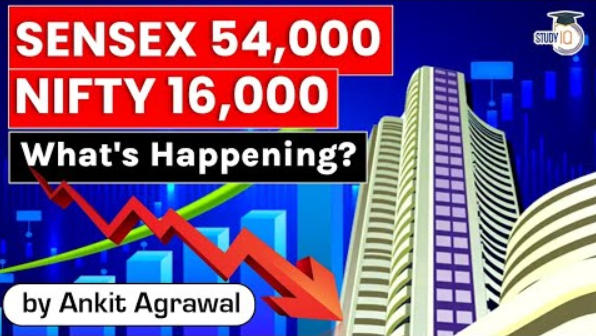Table of Contents
What has happened?
- With the Covid-hit economy showing signs of a comeback, stock markets are on a roll.
- Investors are buoyed by encouraging economic data that showed a recovery in the manufacturing sector index, higher GST collection and improved corporate earnings.
Why are the benchmark indices rising?
- Latest economic indicators point to a recovery on the economic front.
- The seasonally adjusted IHS Markit India Manufacturing Purchasing Managers’ Index (PMI) moved back above the critical 50.0 threshold — up from 48.1 to 55.3 — in July, pointing to the strongest rate of growth in three months.
- On the other hand, India’s gross GST revenues in July recovered sharply to Rs 116,393 crore, after slipping below the Rs one lakh crore mark for the first time in eight months in June.
- “Progressive economic data indicates strong rebound from the impact of the second wave. All major domestic data like PMI index, GST collection, corporate earnings, export data etc favour a strong recovery.
- This has added euphoria in the domestic market reaching new highs, along with context to a drop in global risk after the accommodative monetary and fiscal policy announcements.
- A similar monetary policy is expected from the RBI policy meeting,” said Vinod Nair, Head of Research, Geojit Financial Services.
- The Sensex, which opened for trading above 54,000 on Wednesday morning, hasn’t looked back since then.
Will the bull rally continue?
- Even as markets are trading at all-time highs, experts feel they are expected to trade higher.
- “I see the momentum continuing. While fundamentals of the economy remain strong, over the last few months the collections for banks and financial services companies have been closer to normal, and that has given additional comfort to the markets,” Said Pankaj Pandey, head of research at ICICIdirect.com.
- While the first quarter earnings provided support to the market,
- It also got comfort from lesser than expected impact of second Covid wave, and the consequent lockdowns in April and May, as compared to that seen last year.
- Besides, management commentaries across the board suggest an improved demand environment post June 2021, led by the easing of restrictions, lower active Covid-19 cases and a pickup in vaccinations.
- “We estimate corporate earnings to continue to recover, as the underlying economy opens up, with progressively higher vaccination trends, thus offering many bottom-up opportunities,”
- Said Sneha Poddar, Assistant Vice President, Motilal Oswal Financial Services.
What are retail investors up to?
- The Sensex journey past the 54,000 level has been led by the retail investors who allocated more into equities even as foreign investors sold stocks worth over Rs 10,000 crore in July.
- “The present rally is all the more significant since it provides enough opportunities to the new investor coming in now as several pockets of the economy still offer value going forward,” said S Ranganathan, Head of Research at LKP securities.
- V K Vijayakumar, Chief Investment Strategist, Geojit Financial Services, said, “Sometimes, amateurs beat professionals.
- This is happening in the Indian stock market now. Foreign investors (FPIs), often regarded as representing smart money, have been pushed back by the sheer momentum of retail investors.
- FPIs who have been consistently selling in July on rational hopes of a correction in the overvalued market have been forced to buy on fears of losing out on the momentum.”
- Retail investors and mutual funds, flush with funds, are driving this market without much regard to valuations, said an analyst.
- Having broken the 15,950 Nifty upper band decisively, sheer momentum may take the market higher.
- With institutional money pouring in, large caps are likely to outperform if the market continues its upward momentum.
caution
- Stock market valuations are already high.
- “Any bad news on the political or economic front may spoil the bull party. Retail investors should be very cautious while dealing directly in the stock market. They had burnt their fingers many times in the past,” said veteran BSE broker Pawan Dharnidharka.
- “It’s better if retail investors buy stocks during the correction Putting money at high valuations can cause losses.”
Q) Which among the following is not an objective of SEBI?
- To regulate securities market
- To protect interests of inventors
- To promote businesses
- To promote the development of the market
Latest Burning Issues | Free PDF

























 WhatsApp
WhatsApp